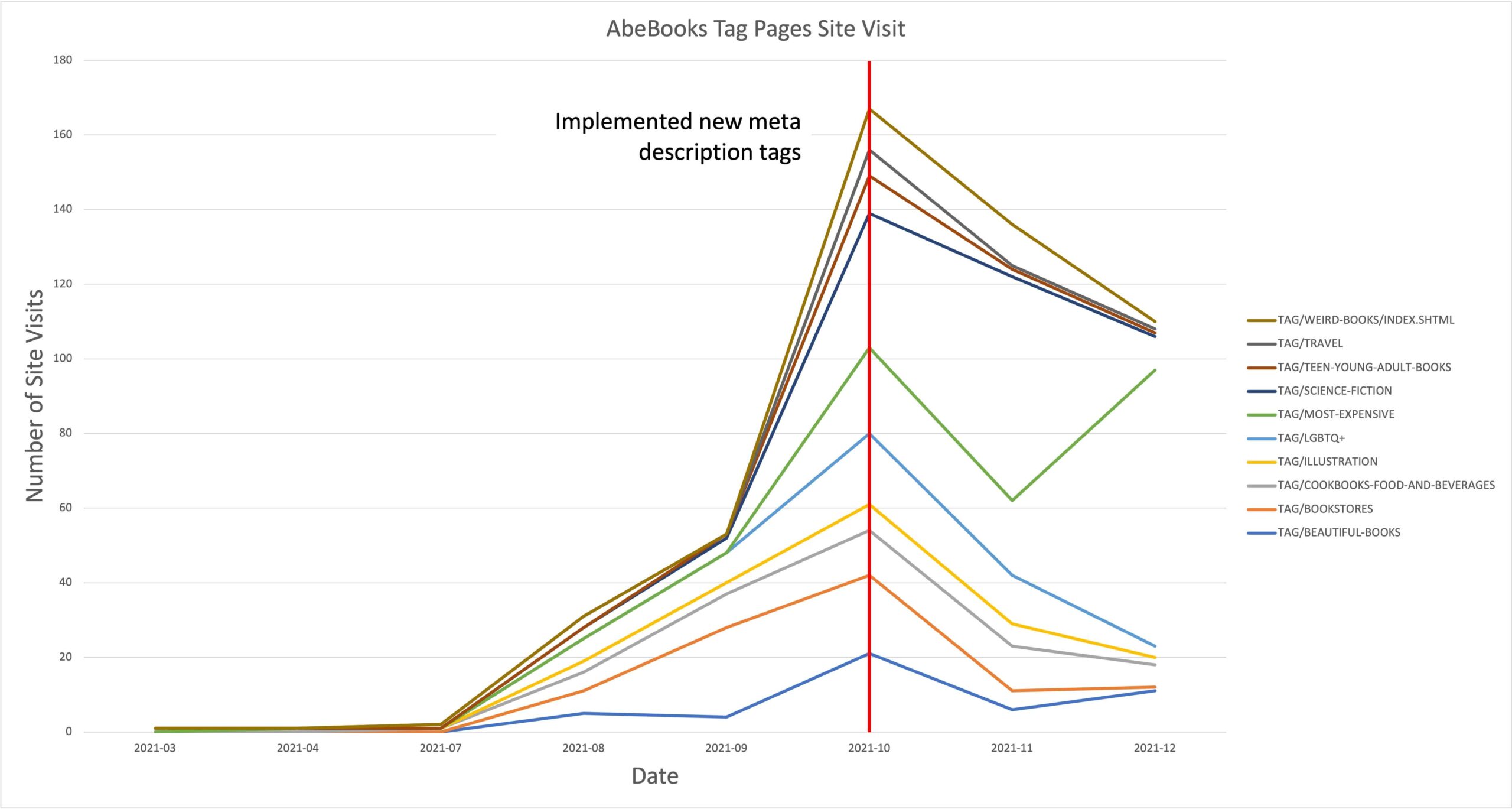SEO
spearheaded research projects to systematically analyze seo channel
SERP APPEARANCE PROJECT
TASK
I was tasked to analyze the SERP appearance of different page types and come up with three top changes that we can implement and test impact. The four page types were:
- Search Results Pages (SRP)
- Product Landing Pages (PLP)
- Book Detail Pages (BDP)
- Merchandising pages
To prepare for this task, I did Moz training and LinkedIn Learning to be up-to-date on SEO best practices. I reviewed webpage source data and noted down important aspects of SERP appearance like localization, branding, keyword bolding, punctuation and capitalization. Additionally, I performed competitor analysis by noting down competitors’ SERP formatting and structure that AbeBooks can adopt. I also leveraged tools like Google Search Console and Google Page Speed to gather insight into our webpages. I also presented my research and recommendations to the Acquisition and Traffic team.
RECOMMENDATIONS
- Use keyword rich multi-titles so listings can rank for more queries
- Audit meta titles to have consistent formatting
- Optimize meta descriptions by removing 'AbeBooks.com:' and reducing the number of unnecessary characters
- Investigate BD page source data and why they’re not eligible for rich snippets
- Investigate whether SERPs with pictures improves CTR
- Format SERPs to organize relevant information
IMPACT
- Worked on a research project that became the Acquisition Team’s OKR. Previous interns were never given this level of responsibility
- Create actionable next steps for the traffic team to implement by page type
- Spearheaded a project that systematically analyzed SERP appearance which is one of the four pillars of free search. Free search is our biggest driver for GMS
SEO HEALTH CHECKS
I was tasked to monitor AbeBook’s weekly free search performance by navigating different Tableau sheets, Google Search Console, Splunk and SEOClarity. I noted down crawl, index and rank trends and alerted my supervisor when performance is down. When Google launched the new algorithm that would rank websites based on user page experience, page speed and mobile experience, our traffic team improved our webpages.
My weekly reports ensured that we were tracking OK post algorithm roll-out. During these reports, I alerted my team on domains that needed attention from traffic team. My reports also illustrated to the traffic team the end-product of their hard work because we saw an increase in rank.
KLP RESEARCH PROJECT
TASK
I analyzed our Keyword Landing Page’s (KLP) crawl, index and rank data to understand why their performance is sub-optimal. I pulled a random sample of 50 Author and 50 NBC KLPs from Abe’s author sitemap and NBC sitemap. I analyzed the KLPs’ crawl, index and rank data using Google Search Console and SEO Clarity. I checked their GMS performance by cross-referencing the sitemaps with merchandising page data. I also checked their page experience score using PageSpeed Insights.
FINDINGS
I discovered that 60% of KLPs in the sample were crawled or indexed while 40% were undiscovered. Additionally, sitemaps proved ineffective in promoting crawl and indexation because all the KLPs weren’t discovered by Google through a sitemap. I also discovered that KLPs had a low page experience score and a low average search volume. Additionally, KLPs had to compete with older AbeBook pages such as SRPs, older static pages, or collections pages for keywords. As a result, KLPs have poor sales, conversion rate and bounce rate. In conclusion, KLPs have low rank not because they’re not crawled or indexed, but because of competition from other AbeBook page types and low average search volume. I also presented my finding to the Marketing Acquisition team.
IMPACT
I generated a thoughtful discussion about AbeBook’s free search and CMS strategy. My project helped guide content strategy in a new direction because the initial plan was to create a lot of static pages and have a widget from the homepage to display all these static pages. However, my research and data from other subsidiaries demonstrated that this was not a good strategy for free search.

SEO ONE-PAGER
With AbeBook’s new CMS, static page creation was more accessible to users. Therefore, I was tasked to create an SEO guide for creators who aren’t familiar with free search. I was tasked to create a brief SEO one-page guide for content creators. I researched SEO best practices and had check-in meeting with Jessica to ensure that I was on the right track and if I was missing content. I incorporated her edits and presented Jessica with a final product that was used as official documentation for marketing and non-marketing teams. My guide includes
- Best practices to improve the discoverability of content via search engines
- Step-by-step instructions on how to edit your content's SEO settings through Brightspot
- How to get search engines to index your page
"Wrote an important piece of the AbeBooks Content Program"
FEEDBACK
Feedback from Jessica Murray, SEO specialist on Marketing Acquisition team who assigned me this task
“Wrote an important piece of the AbeBooks Content Program and will serve members of acquisition, retention, SMCS, and brand marketing – not to mention customers.”
RANK DASHBOARD ANALYSIS
My supervisor is the Free Search specialist on the team. Before she went on vacation, she asked me to take on more responsibility with Free Search and field questions from other members of the team. When she was on vacation, Google implemented their algorithm changes on June 15th, 2021. The new algorithm ranked websites by their core metric experience such as
- Number of Good URLs vs Bad URLs
- Page Experience
- Page Speeds
- Bounce rate
Due to the algorithm change, Free Search traffic to our website was down and the Director of Marketing wanted my colleague and I to confirm that our low traffic wasn’t because of rank. I created an excel sheet using SEOClarity data to create a rank breakdown dashboard for all of our domains.
MY DASHBOARDS HAD DATA LIKE:
- Rank trends for keywords based on page type
- Average Keyword Search Volume for keyword genre
- Number of tracked keywords for keyword genre
- Classification on average keyword search volume (is the amount significant? insignificant? etc)
With my dashboard, I discovered that rank improved the week of June 15, 2021. Therefore, the low traffic that week wasn’t caused by rank. By disproving that hypothesis, we were able to pursue other theories behind low traffic. Upon further investigation, we discovered that our reporting tool, Acoustics, wasn’t tracking all of our traffic so our reports appeared lower than usual. After discovering that issue, we were able to fix our reporting dashboards.
CMS TAGS DESCRIPTION
For the new CMS, we needed to create descriptions for 22 tag pages. Tags are important for AbeBook static pages because they’re a tool for interlinking and offer both customers and search engines more opportunities to discover content. I was tasked to create those descriptions. I went above and beyond by conducting keyword research for each tag page to optimize SEO using Google AdWords Keyword Planner tool. I also wrote compelling copy that summarized the page’s content and incorporated high ranking keywords with low competition. My SEO-friendly descriptions led to 6X more traffic to those static pages.

